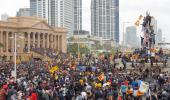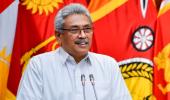A group of protesters on Saturday entered the private residence of Sri Lankan Prime Minister Ranil Wickremesinghe and set it on fire, hours after he offered to resign to make way for an all-party government amid unprecedented protests in the country for the resignation of the government led by President Gotabaya Rajapaksa.

The protestors entered 73-year-old Wickremesinghe's house on 5th Lane in Colombo and set the place on fire after a tense situation erupted between the protestors and security forces on the ground. It wasn't immediately clear if he was inside at the time of the attack.
Despite tear gas being fired on the protestors to disperse, they entered his house and set the house on fire, authorities said.
Videos posted online showed protesters rejoicing after setting the house on fire.
Earlier in the day, anti-government protesters entered the Presidential House in Colombo. The president's whereabouts were unknown and it is believed the 73-year-old leader left the house before the massive mob arrived.
Meanwhile, Colombo Municipal Council (CMC) fire brigade said they were informed that the prime minister's private residence in Colombo was set on fire and its teams were unable to reach the location due to the unrest.
The incident came hours after Wickremesinghe offered to resign.
The prime minister's media division said that Wickremesinghe will resign after an all-party government is established and the majority is secured in Parliament.
His office said that Wickremesinghe will continue as prime minister until then.
Sri Lanka, a country of 22 million people, is under the grip of an unprecedented economic turmoil, the worst in seven decades, crippled by an acute shortage of foreign exchange that has left it struggling to pay for essential imports of fuel, and other essentials.
Protesters blame Rajapaksa for the country's economic malaise, the worst since independence in 1948.
Last week, Wickremesinghe announced in parliament that Sri Lanka would present a debt restructuring programme to the IMF by August to secure a bailout package while underlining that the negotiations with the global lender were more complex and difficult than in the past because the country was ”bankrupt”.
The country, with an acute foreign currency crisis that resulted in foreign debt default, had announced in April that it is suspending nearly USD 7 billion foreign debt repayment due for this year out of about USD 25 billion due through 2026.
Sri Lanka's total foreign debt stands at USD 51 billion.












 © 2025
© 2025